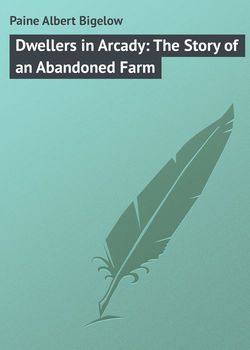Читать книгу Dwellers in Arcady: The Story of an Abandoned Farm - Paine Albert Bigelow - Страница 8
CHAPTER TWO
IV
The soft feet of the rain on the shingles
ОглавлениеWhen the articles I had chosen from the apartment arrived Westbury carted them up the hill and we entered into possession of our new estate – not of the house (some painters had possessed themselves of that), but of the wood-house and barn. The barn was a big, airy place, suitable for a summer dormitory. The wood-house was not big, but it was empty and had been set in order. It had a stove-pipe hole, and Westbury contributed a stove – the first one ever made, he said, or, at any rate, the first ever used in that neighborhood. It was a good stove, too, solidly cast, almost unbreakable. Its legs were gone, which was no great matter, for we set it up on bricks. With a box for a table, we had a proper living-room, handy and complete.
Not entirely complete, either – the old stove had no pipe. But just then it happened that the groceryman came along, making one of his two trips a week. He would deliver during the afternoon, he said, and could bring along some pipe for us. He did that, but it was a kind of pipe that didn't fit – not very well.
If there is anything that would make a man forget the Great War it would be putting up stove-pipe. It seems, somehow, to overshadow all other misfortunes. Some persons might have enjoyed matching up those units, but I did not. I have no gift that way. Elizabeth said she would help, but she didn't seem to use good judgment – not the best. When I was making a painfully careful adjustment she was possessed to push a little, or something, and make my efforts futile. Once when the box I was standing on tipped over and I came down, with the pipe resolved into joints, she seemed to think it amusing. At times, too, our tribe of precious ones came racing through. By the time the job was finished Elizabeth and I were treating each other rather coolly – that is to say, politely. But this was temporary. The soft purr of a fresh fire, the pleasant singing of a kettle, set us to laughing at our troubles. Man Westbury came driving up with some green corn, lettuce, and beans from the garden; also a chicken and a pie hot from Lady Westbury's oven. Those blessed neighbors! How good they were to us! In less than no time the corn and beans were in the pot and I was dressing the lettuce. We had brought down some of the old chairs from the attic, and the tribe assembled with a whoop to place them. A little more, and we were seated. The Hope, aged seven, who had a gift for such things, asked a blessing, and we had begun life in the new home. I wonder why tears are trying to come as I write about it. There was never a better meal, or a jollier one – never a happier, healthier family.
A shower came up and settled into a gentle rain. The barn, where we were going to sleep, was a good step away, so that when the time came we put on our rubbers, took our umbrellas and a lantern, and set out for bed. There was nothing very wonderful about all this, of course; it only seemed wonderful to us because it was all so new. The Pride and the Hope declared they were always going to sleep in the barn, and when we got inside the big, lofty place, and in the gloom overheard heard the soft feet of the rain on the shingles, I, too, had a deep-down wish that there was nothing in the world, but this – that the pleasant night and soothing patter might never cease.
Truth obliges me to confess that on that first night our bed was not an entire success. For convenience and economy we had laid it in a continuous stretch on the floor, with some hay beneath. There being not enough mattresses for all, I had built an extension of hay for the elder members of the family. It was the best hay, but I had used it too sparingly. I suppose I had not realized how, with adjustment, it would pack and separate. I know it had hardened considerably by the time I had made one or two turns as a necessary preparation for sleep. I remarked each time how delightful it all was, to which Elizabeth agreed, though she had the courage presently to venture that she didn't think it quite as soft as one of Lady Westbury's feather beds. The Pride observed that there seemed to be a certain horsey smell that did not entirely please her, though the Joy, who was probably imagining herself hitched in one of the stalls, declared that she liked that best of anything. As for the Hope – clear of conscience and worn with the riot of the day – she had plunged without a moment's hesitation into the blessed business of sleep. It engaged us all, at length, and we must have become adapted by morning, for when we were all awake and lay in the dim light, listening to the quiet music of the continuing rain, there was no voice of discontent. Elizabeth thought it likely that she was considerably bruised, but, as she made no complaint later, this was perhaps a false alarm.
